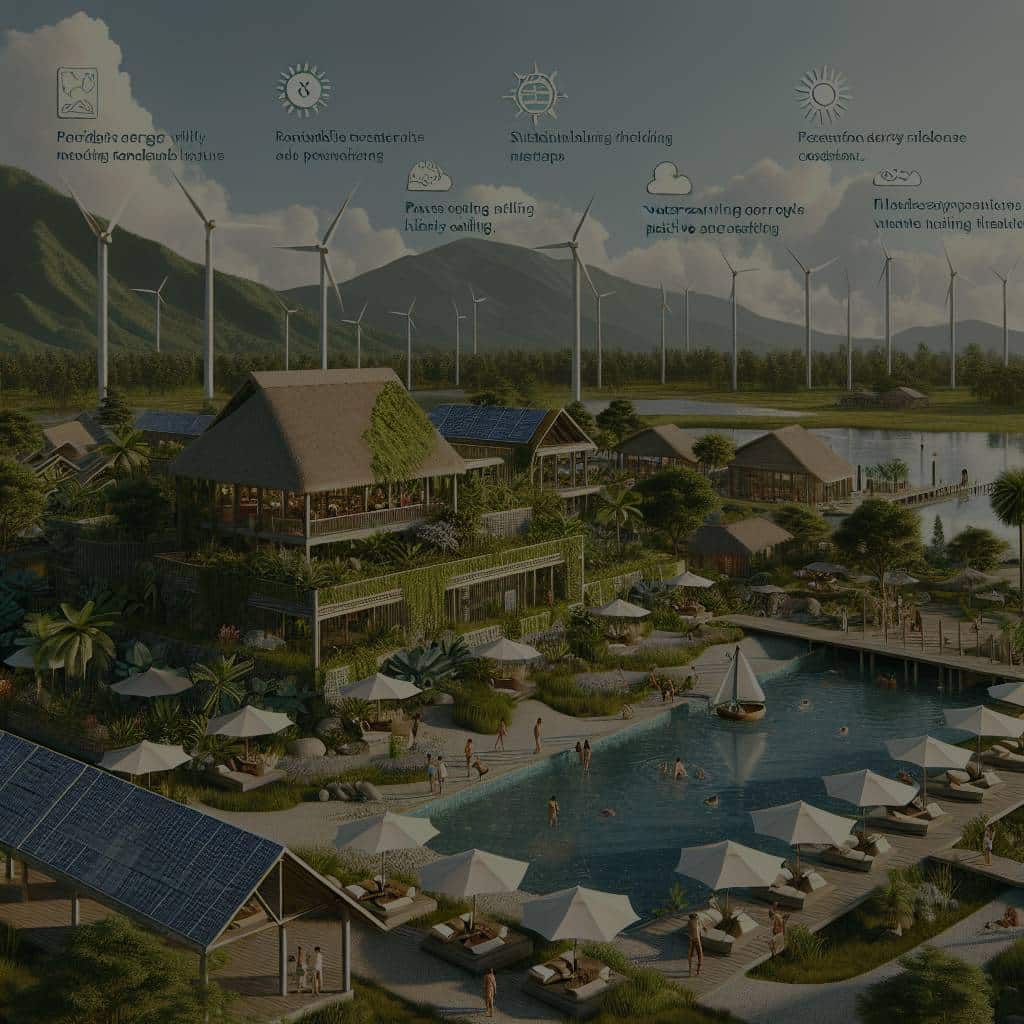How to Develop Eco-Friendly Holiday Resorts with Minimal Environmental Impact?

As the green movement continues to gain traction, many industries are adapting to meet the demand for sustainable options. The tourism sector, and more specifically, the hotel industry, is no exception. More and more travelers are seeking accommodation options that align with their commitment to sustainability. For you as a hotelier, this is a clear call to action to significantly reduce your environmental impact. In this article, we offer you a comprehensive guide to developing eco-friendly holiday resorts with minimal environmental impact.
Embrace Renewable Energy Sources
To begin with, the energy used in your hotel operations often contributes significantly to carbon emissions. Switching to renewable energy sources is, therefore, a key step in creating an eco-friendly resort.
Also read : How to Optimize Real Estate Portfolios for the Post-Pandemic Remote Work Era?
Solar and wind energy are some of the most common and effective sources of renewable energy. They can be used to power different areas of your hotel, from heating and cooling systems to lighting and other electrical needs. Using renewable energy sources not only reduces your carbon footprint but can also result in significant savings on energy costs in the long run.
Additionally, consider implementing energy-efficient appliances and devices in your resort, such as LED lights and energy star appliances. These options use less energy and thus further reduce your resort’s carbon emissions.
Also read : What Are the Key Considerations for Investing in Student Housing Markets?
Practice Water Conservation
Water is another resource that hotels consume in large quantities, and its misuse can have major environmental consequences. Therefore, adopting water conservation measures is crucial in creating an eco-friendly resort.
One way to do this is by installing low-flow fixtures and appliances, such as showerheads, faucets, and toilets. These fixtures use less water than their traditional counterparts, helping your resort save water.
Another effective water conservation strategy is to implement a rainwater harvesting system. This system collects and stores rainwater, which can then be used for various purposes in your hotel, such as landscaping and cleaning.
Minimize Waste
Reducing waste is also an essential part of developing an eco-friendly resort. Waste generated by hotels can have a significant environmental impact, particularly when not properly managed.
Begin by implementing a comprehensive recycling program in your hotel. Ensure all waste materials that can be recycled, such as paper, plastic, metal, and glass, are separated and sent to recycling facilities.
Furthermore, consider introducing composting for kitchen and garden waste. Compost can be used to enrich the soil in your landscaping, promoting the growth of local flora.
Prioritize Local and Sustainable Suppliers
Your choice of suppliers can also have a significant impact on your resort’s sustainability. Prioritizing local and sustainable suppliers can greatly reduce your hotel’s carbon footprint.
Choosing local suppliers reduces the amount of travel associated with delivering goods to your hotel, thus reducing carbon emissions. Additionally, local suppliers often use more sustainable farming and manufacturing practices, which align with your resort’s commitment to sustainability.
Promote Green Tourism
Lastly, promoting green tourism practices among your guests can further enhance your resort’s sustainability.
Encourage your guests to engage with the local community and to take part in environmentally-friendly activities. This could include hiking, cycling, and wildlife viewing, all of which have a minimal environmental impact.
Provide your guests with clear information about your resort’s sustainability initiatives. This will help them understand and appreciate your commitment to environmental sustainability, and may even inspire them to adopt similar practices in their own lives.
In conclusion, developing an eco-friendly holiday resort involves a comprehensive approach that encompasses energy use, water conservation, waste management, supplier choice, and green tourism practices. With a clear understanding of these areas and a commitment to continual improvement, you can create a resort that not only meets the demands of eco-conscious travelers but also contributes positively to the health of our planet.
Adopt Sustainable Architecture and Design
Building an eco-friendly resort goes beyond just daily operations; it starts from the ground up, literally. Sustainable architecture and design principles are key to developing a resort with minimal environmental impact. Notably, these principles encourage the use of local materials, which reduces transportation-related carbon emissions and supports local industries.
When designing your resort, it is essential to consider the local climate. Utilize architectural designs that work with the local climate, not against it. For example, in hot climates, you could design your resort to maximize natural ventilation and shade, reducing the need for air conditioning. Alternatively, in colder climates, incorporating features like double-glazed windows and insulation can help to reduce heating requirements.
A significant aspect of sustainable architecture involves integrating your resort with the surrounding natural landscape. This could mean designing your resort to blend in with the natural environment, using landscaping to provide shade and reduce energy consumption, and preserving natural habitats where possible.
Moreover, consider the use of green building materials. This includes materials that are sustainably sourced, recycled, or have a low environmental impact in their production and disposal. Such materials not only reduce your resort’s carbon footprint but may also offer cost savings in the long run.
Implement Sustainable Food Practices
Food is another area where your resort can make significant strides in sustainability. By implementing sustainable food practices, you can greatly reduce your resort’s environmental impact and contribute to a more sustainable food system.
To begin with, you could source food locally. This not only reduces carbon emissions associated with long-distance food transportation but also supports local farmers and the local economy. Additionally, locally sourced food tends to be fresher and more flavorful, enhancing your guests’ dining experience.
Next, consider offering plant-based meal options. The production of plant-based foods typically has a lower environmental impact than that of animal-based foods. Offering plant-based options at your resort can cater to the growing number of eco-conscious guests who follow a vegetarian or vegan diet.
Lastly, minimize food waste at your resort. You can achieve this by carefully planning your meals and portion sizes, repurposing leftovers, and composting food scraps. Reducing food waste not only lessens your resort’s environmental impact but can also result in significant cost savings.
Conclusion
In an era where sustainability and eco-consciousness are increasingly important, developing eco-friendly holiday resorts is no longer just a nice-to-have, but a necessity. From the architectural design of the resort to the daily operational practices, every aspect needs to be considered and planned with sustainability in mind.
By embracing renewable energy sources, practising water conservation, minimizing waste, prioritizing local and sustainable suppliers, promoting green tourism, adopting sustainable architecture, and implementing sustainable food practices, your resort can significantly reduce its environmental impact.
Indeed, these efforts will not only cater to the growing demand for environmentally-friendly accommodations and sustainable travel but will also contribute positively to the health of our planet. Remember, every step towards sustainability counts, and every action you take can make a significant difference. In the end, developing an eco-friendly holiday resort is not only beneficial for your business but also for our shared environment and future generations.
